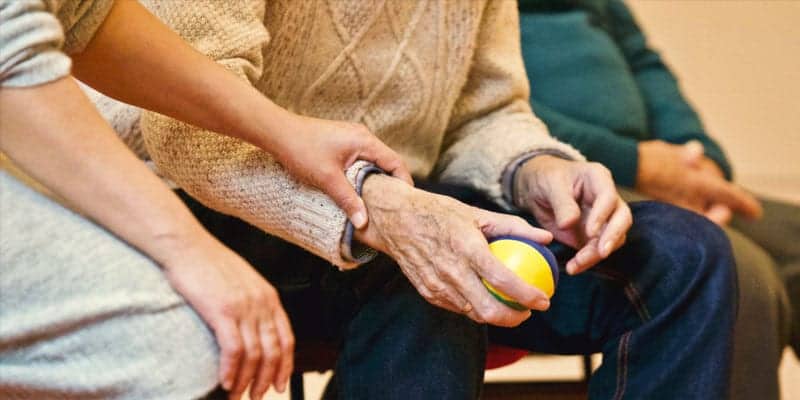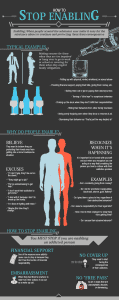Many people who are close to a substance abuser would be quite surprised to learn how big of a part they played in the progression of their loved one’s disease of addiction, and need to learn how to stop enabling an addict. 
What is Addiction?
Before you can understand how to stop enabling an addict, you need to understand what addiction is. First, know that your loved one did not mean to become addicted. Most addicts have no intention of forming addictions at all. They use because it makes them feel good, or because they feel they need to. The National Institute on Drug Abuse defines addiction as wanting to stop using drugs, but feeling unable to. Many experts believe that addiction is a disease, including the American Medical Association. An addiction is a relapsing condition that is very difficult to heal from.
Addiction Warning Signs
Quite often, people don’t realize they have addictions at all. Some refer to this as living in denial. However, there are some warning signs that indicate that an addiction is present. These might include:
- Having legal problems related to substance abuse
- Using a lot of the substance at one time
- No longer participating in once enjoyed activities
- Keeping stashes of the substance hidden away
- Experiencing financial problems
- Having relationship problems because of the substance use
Have you noticed any of these in your loved one? If you have, it may be because of an addiction. If you’re not sure, taking a quiz can help you gain some clarity on the situation. You may have known that your loved one was abusing substances. However, you never thought that an addiction was a concern you should have. You’d be surprised to find out that many others feel the same way about their loved ones. 
What Is Enabling?
In simple terms, “enabling” occurs when those around the substance abuser – the spouse/significant other, various family members (typically, parents, siblings, or children) or close friends –make it easier for the drug or alcohol abuse to continue by insulating their addicted loved one from the natural consequences of their actions. Unfortunately, many addicts find that they have someone who is willing to enable their addictions. These enabling behaviors can be detrimental to the person who is using. This is why it’s so important to stop enabling behaviors immediately. Enabling is definitely a misguided practice. It is born out of the best intentions, and enablers often believe that they are helping. Very rarely do people see a problem with what they’re doing when it comes to enabling. It’s so important to learn how to stop enabling an alcoholic or an addict in order to facilitate recovery.
If Your Loved One is an Addict…
If you find that your loved one is an addict, there are some things you should do. There are also some things you should not do. You should:
- Maintain your own sense of balance in your life
- Find a drug and alcohol rehab program for your family member
- Offer emotional support to your loved one
- Insist that going to an addiction treatment program is the right step
- Avoid blaming anyone for the addiction
You should not:
- Expect that things will change just because you ask your loved one to stop using
- Choose a rehab program that doesn’t show evidence for how they can help
- Allow yourself to be abused mentally or physically
- Expect that your loved one will immediately go to rehab
- Assume that rehab will make everything better again because this is a long process
You may find that you have done some things you shouldn’t have done. Or, perhaps you haven’t done some things you should. Enablers need these behaviors to be brought to their attention before they realize the dangers of them. “Enabling is a poor-quality glue. It not only doesn’t succeed in keeping the marriage, family, or friendship together, it allows the disease to progress to a more serious stage, and worsens the prognosis for a good recovery.” ~Arlene Eisenberg and Al J. Mooney, The Recovery Book
Enabling Behaviors
Before you can stop enabling behaviors, you first have to learn why they are so harmful. When people enable addicts to continue using, they don’t think they’re doing any harm. After all, it’s only natural to want to help someone we love. However, when enabling is a factor, “helping” is not what is happening at all. Enabling means that you’re doing something positive, but that positive action has a negative result. In this way, the reaction is the exact opposite of what the enabler really wants to happen. It’s important to learn how to stop enabling an alcoholic or addict. It’s important to pinpoint what some of your enabling behaviors might be. You can begin by taking a quiz to find out if you are an enabler.
What ARe Some Typical Examples of Enabling Behavior?
Usually, family members will enable a continued addiction by “cleaning up” after the substance abuser and their unacceptable behaviors. Some examples are:
- Making excuses for them when they are to impaired or hung over to go to work or school
- Covering for them when they neglect family obligations
- Putting up with physical, verbal, emotional, or sexual abuse
- Providing financial support – paying their bills, giving them money, etc.
- Bailing them out of jail or paying their attorney’s fees
- Turning a “blind eye” to suspicious behaviors
- Picking up the slack when they don’t fulfill their responsibilities
- Hiding their behaviors from other family members
- Being overly forgiving – even when there is no remorse or apology on the substance abuser’s part
- Dismissing their behavior as “That’s just the way he(she) is”
The Difference Between Enabling and Co-dependency
You’ve learned that enabling behavior happens when someone encourages an addict to use substances. This can happen either directly or indirectly. In this way, co-dependency is related, but there are some differences. Co-dependency happens when someone is controlled by an addict’s behavior. Co-dependents eventually come to learn that they receive love and acceptance by caring for their addicted loved ones. They must follow the addict’s every desire in order to be accepted. This allows the addict to define reality for both of them. In the end, it becomes a terrible cycle that needs to be stopped. Otherwise, recovery will never be able to occur in these situations.
Why Do People Enable Addicts and Alcoholics?

- “If I don’t help, they’ll be out on the street.”
- “They might go to jail.”
- “It’s too embarrassing to get help.”
- “I don’t want their addiction to get worse.”
- “I deal with it because I don’t to break up the family.”
- “I’m tired of fighting with them.”
- “Maybe this time they’ll change.”
Enabling their behavior does not help the substance abuser. In truth, it is one of the worst things that can be done for them. The reality is most people enable another’s addiction in an attempt to meet their own needs. They desire attention, stability, or love. But over time, their perceptions, reactions, and even their emotional needs become warped because of the damage and distortion of the disease of addiction causes. And that damage becomes even worse as the disease progresses, because the frequency of abuse increases and the consequences to the entire family worsen. It becomes harder for the enabler to cover up for the addict/alcoholic, just as it becomes more difficult to “forgive and forget”. Life becomes a spiral of resentment and dysfunction.
How Can I Know If I’m Enabling My Addicted Loved One?
It can be hard to draw the line between loving someone with a substance use disorder and enabling their disease. Here are some questions you can ask yourself to see if you are guilty of enabling behaviors:
- Am I constantly giving them money?
- Do I fall for their manipulation – emotional blackmail, shame, guilt, flattery?
- Do I give them a place to live, regardless of their destructive behaviors?
- Do I provide their transportation and pay their insurance?
- Do I pay for their phone?
- Do I assume responsibility for their legal bills?
- Have I lied to their employer to keep them from getting fired?
- Do I cover up for them with family members because of embarrassment?
- Do I excuse their abusive behavior?
- Is THEIR addiction making MY life unmanageable?
If I’m Guilty of Enabling, How Do I Stop Enabling an Addict?
That’s just it – if you are enabling someone else’s addictive behaviors, you have to STOP. It may sound simple, but stopping your enabling actions can be one of the most difficult things you’ve ever done, because it goes against your natural desire to help your suffering loved one. You have to STOP protecting the substance abuser from the consequences of their own actions.
- STOP supporting them financially.
- STOP covering up for them.
- STOP saving them from embarrassment.
- STOP giving them a “free pass” to act in ways that are unacceptable, abusive, or demeaning.
- STOP putting the needs of their disease before yours or those of your family.
- Immediately START tying all of your future contact, support, and protection to their getting professional help for their disease of addiction.
When you do these things – when you remove your unconditional support – you force the addict/alcoholic to change what they are doing. They have to start standing on their own two feet, and if they can’t, then that usually spurs them into seeking help. Just as important, it allows you to focus on YOURSELF and the rest of the family, no matter what the other person is doing. You can start working on restoring manageability and sanity to your own lives, just as your addicted loved one will have to do for their own self. This doesn’t mean that you no longer care about your struggling loved one. On the contrary, when you learn how to stop enabling an addict it means that you are no longer supporting their disease. You are taking the difficult but necessary step that gives them the necessary motivation to face their problem. If and when they decide to seek and accept professional help – and when they complete their treatment program – you can together work on moving forward. But remember, you can’t be there for someone else if you’re not there for yourself first.
Getting Hlep for a Loved One Facing Addiction
You want to learn how to stop enabling an addict or an alcoholic in your own life. This means finding out how to get help for your addicted loved one. The first step is to talk with your loved one. Of course, you need to know beforehand that this conversation might not go well. Your family member is likely to get very angry, and even threaten you emotionally or physically. Choose a time to talk when your loved one is sober, and when there are no distractions around. Chances are pretty good that just talking won’t help much. At that point, you need to take a different course of action. This might be staging an intervention. You can access intervention services through most drug and alcohol rehab centers. An intervention is a meeting that includes your loved one, yourself, and other participants. An interventionist will be there to help you know what to say, and how to say it. Interventions are extremely powerful, and they are effective too. If you have an addicted family member, this is certainly something you need to consider doing. You may even be surprised when your loved one finally agrees to get help. Doe Zantamata, author of the book, Happiness in Your Life–Book One: Karma, wrote, “Encourage, but don’t enable. Helping people is wonderful, but carrying someone who could walk by themselves will only slow you both down.” Breaking free from the dysfunctional cycle of enabling behaviors is difficult, and usually requires professional help from a licensed interventionist or another substance abuse specialist. If you have further questions about what you can do to help your addicted loved one, you should contact an intake specialist at Northpoint Recovery today.
Help for Families Who Want to Stop Enabling Behavior




